'Right to Offend' revelations: How Black comedians laughed through pain of social movements
The phrase "laugh to keep from crying" is brought to life in a new documentary exploring Black comedy's relationship with social justice movements through history.
Executive producer Kevin Hart's "Right to Offend: The Black Comedy Revolution," (available on-demand and streaming now on the A&E app) premiered at Tribeca Festival in June and chronicles a comedy lineage from the 19th century to today's comedians while highlighting the movements and injustices many of their laughs were up against.
The two-part documentary highlights retellings of the comedic impact Dick Gregory, Moms Mabley and Richard Pryor across 51 interviews with historians and entertainers including Steve Harvey, Tiffany Haddish and W. Kamau Bell.
"The social and political time that allowed these Black men and women to achieve the status that they have achieved," Pryor's daughter Rain Pryor tells USA TODAY, "… is a very powerful position to be in."

Can America take a joke?: Yes. Dave Chappelle, Chris Rock incidents are part of a continuum, experts say
The careers of these principal comedians are highlighted as foundations for the work of modern comedians Dave Chappelle and Chris Rock, in spite of their recent controversies.
Partly because the documentary was finished before Chappelle's "The Closer" and Rock's Oscars joke that ended in a Will Smith slap, the incidents aren't largely part of "Right To Offend," but co-director Mario Diaz hopes the film can help society understand these moments for those "really important discussions" about today's comedy.
'Sincerely hurt me': Dave Chappelle turns down naming honor after 'The Closer' student backlash
"We wanted to try to take you to history and give you all this background, then you can have those conversations," Diaz says.
Here are some of the revelations of the laughs retold in the documentary:
Charlie Case moved comedy away from blackface, invented 'punchlines'
One of the most universal terms in comedy was created by Charlie Case, who pushed the Black entertainment needle away from racist minstrelsy and blackface during the vaudeville era by forging a new path of entertainment with storytelling.
"Back then there weren't really comedians, they didn't exist yet," journalist and author Michael Harriot said in the documentary. "He started forgetting about the song and dance part because everybody wanted to hear him talk."
More: Dave Chappelle is accused of ‘punching down.' Can comedy go up from here?
During Case's routines in the early 20th century, he'd often tell stories using his arms in a punch-like motion, which evolved to become known as the "punchline" so widely used in comedy today to describe the line that a comedian uses to land a joke.
"He's the man who started stand-up comedy," comedian Alonzo Bodden said. "I always (get) messed up thinking about that because like wow, we invented that."
Gregory broke comedy's color barrier
Well after the era of minstrel shows and the invention of punchlines came Gregory, whose laughs landed with those enduring the brunt of the Civil Rights movement before he became an activist in the movement himself.
"You think about the pressure these guys were under, to be funny in a time where nothing was funny if you were Black," Rock said in the doc. "Most people don't have that kind of confidence, but Dick Gregory did."
Gregory's racial barrier breakthrough came after he was presented the opportunity to fill in at Chicago's Playboy Club. The audience was filled with white business owners from the South.

By telling jokes and making a mockery of the Ku Klux Klan, Gregory won the crowd's affection when others didn't expect him to be well received. In an archived interview, Gregory said the set was such a success that Playboy founder Hugh Hefner booked him for two more weeks, making it "the first time that a negro comedian had been booked in a white nightclub."
More: Dick Gregory, legendary comic and civil rights activist, dies at 84
"There's no better way to learn than when you're laughing and being entertained," Gregory's son, Christian Gregory tells USA TODAY. "My dad was a master of that."
Whoopi Goldberg's one-woman show shed light on women's issues
Long before Whoopi Goldberg was an EGOT winner and host of "The View," she captivated audiences in the ’80s with her one-woman show where she discussed race, sexuality, standards of beauty and abortion.
Her self-titled Broadway show, which was first called "The Spook Show," earned the entertainment mogul a recording Grammy but it also earned her a spot as a pivotal comedian, addressing topics that weren't widely discussed in the male-dominated field.
'Yes, I am back': Whoopi Goldberg returns to 'The View' after suspension
The show featured Goldberg taking on different characters, including a Valley girl, an old man and a young child. Goldberg delivered monologues from the character's point of view, but the material came from her own life experiences, including a time she performed an abortion on herself, told through the lens of a teenage Valley girl character.

Goldberg's timely comedy came at a moment during Reagan-era politics where reproductive rights were a hot-button issue.
"It was the 'Hamilton' of its day. The characters spoke to different folks that were left out of the (comedy) boom that was taking place during the 1980s," author Bambi Haggins said in the doc. In that decade comedians including Eddie Murphy, Robin Williams and more were taking off.
In an archived interview, Goldberg said she wanted audiences from her show to "go home with a working mind." She continued with a smile saying, "as long as they're thinking they won't be apathetic."
This article originally appeared on USA TODAY: Whoopi Goldberg, Dick Gregory comedy impact told in 'Right To Offend'

 Yahoo Movies
Yahoo Movies 